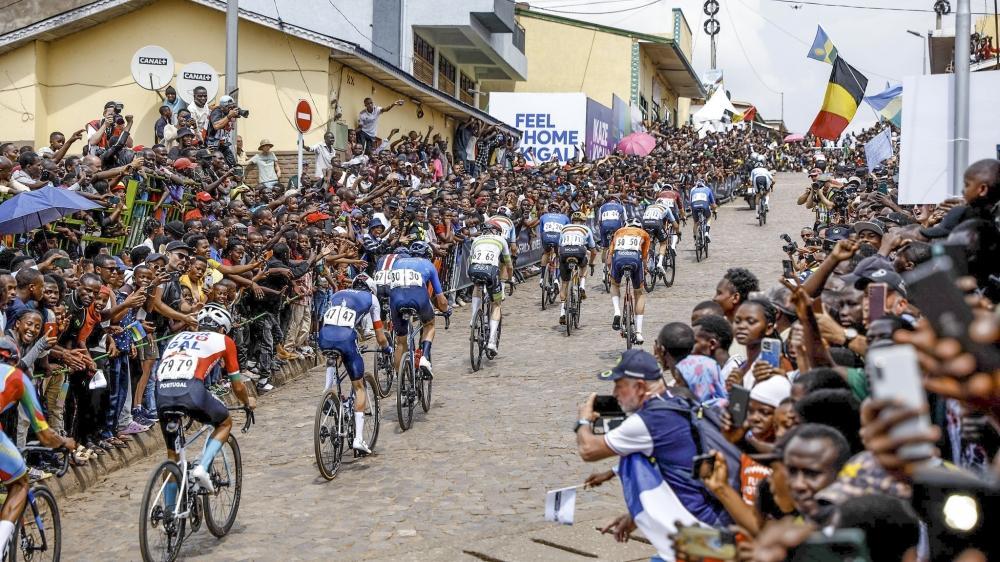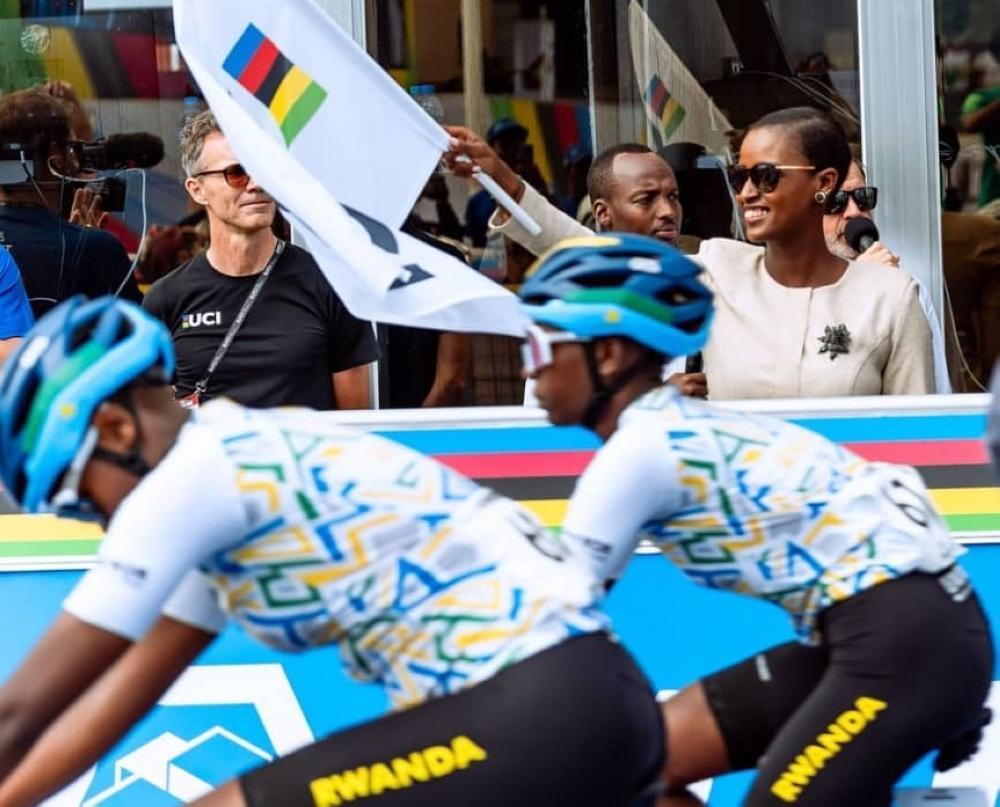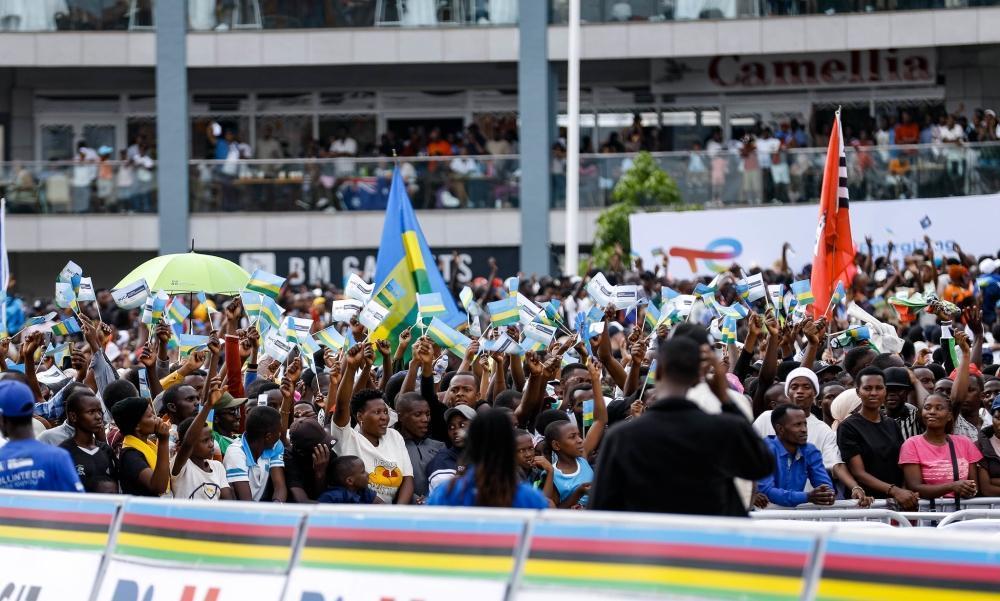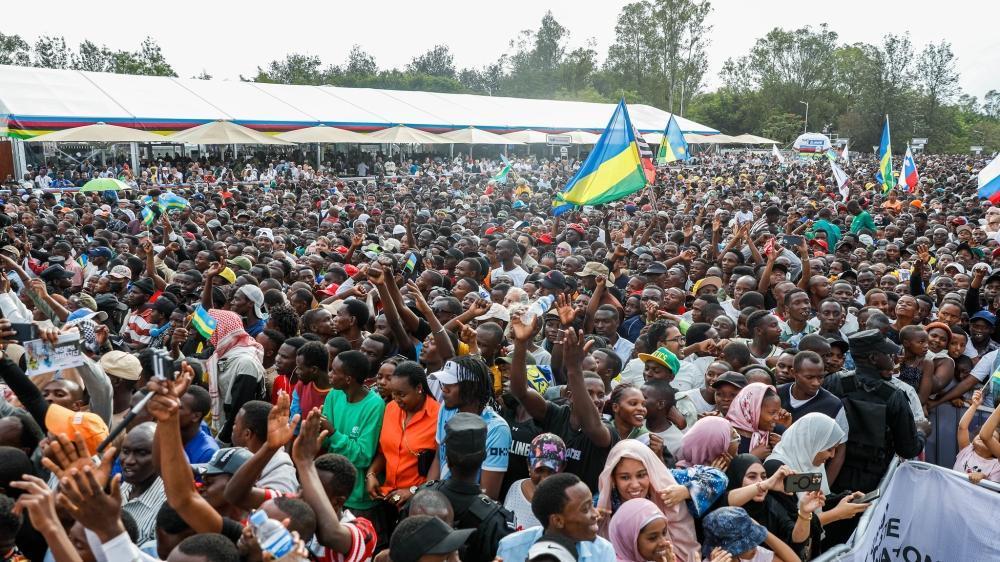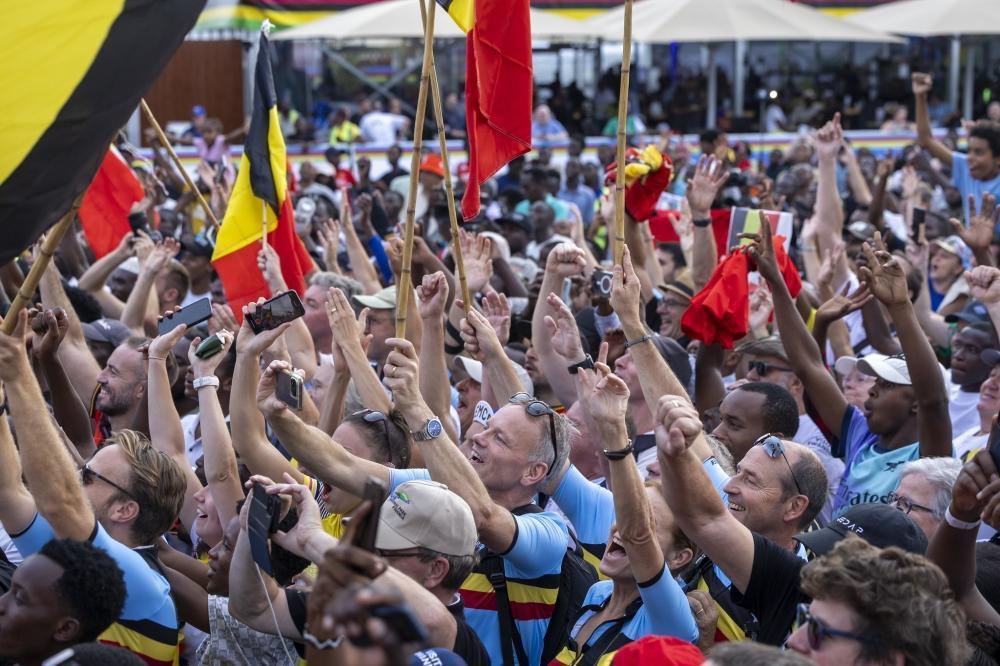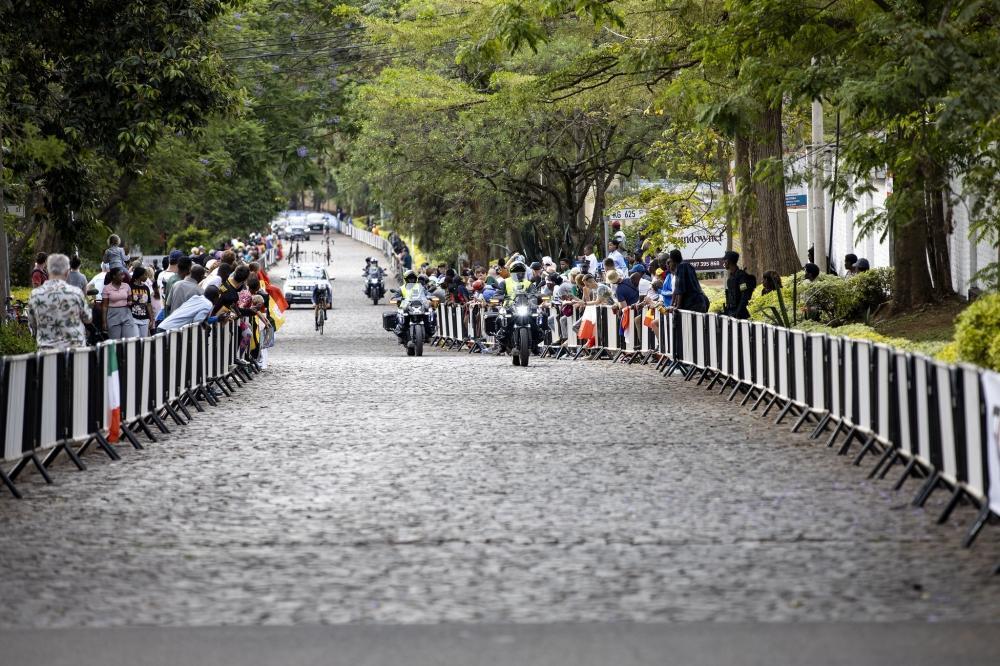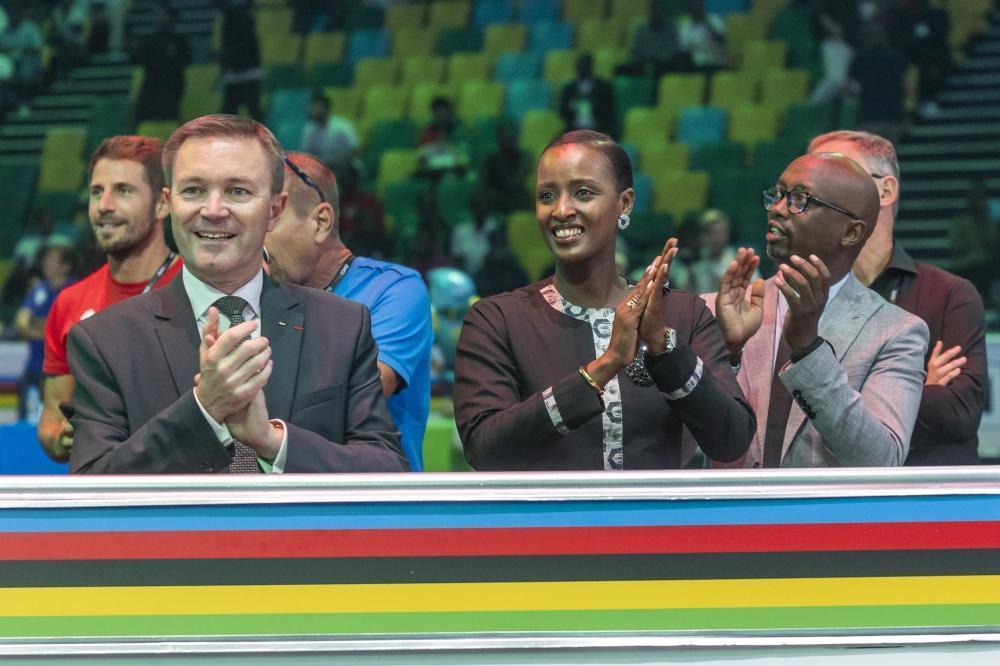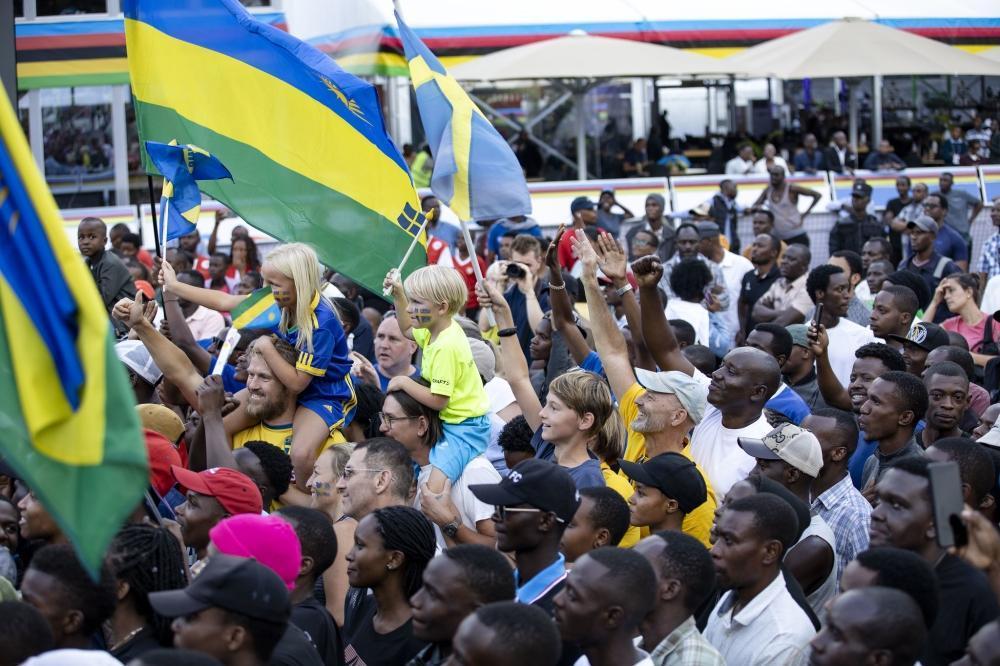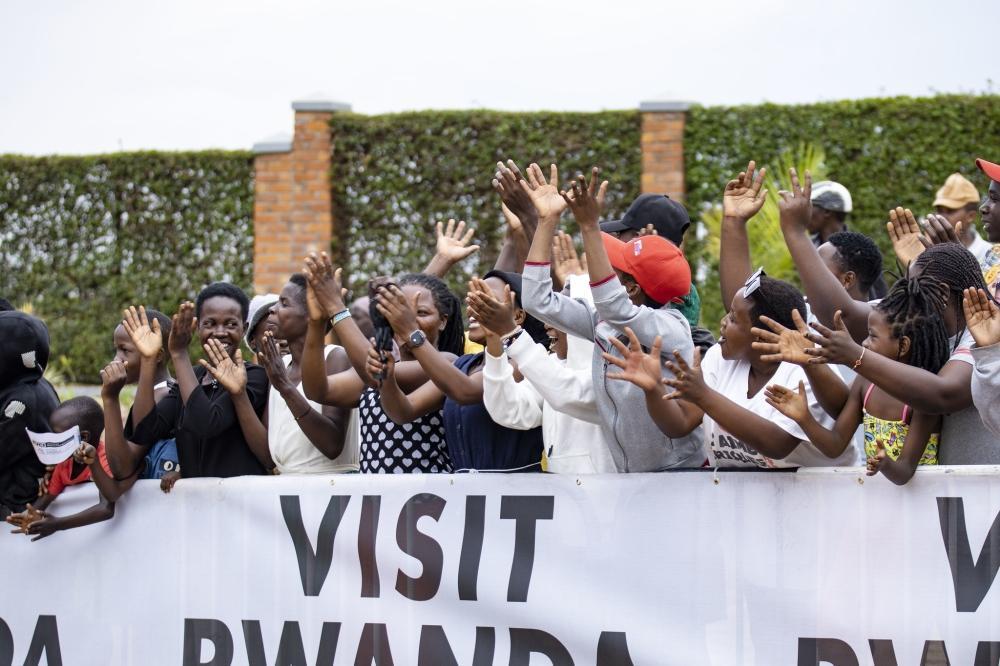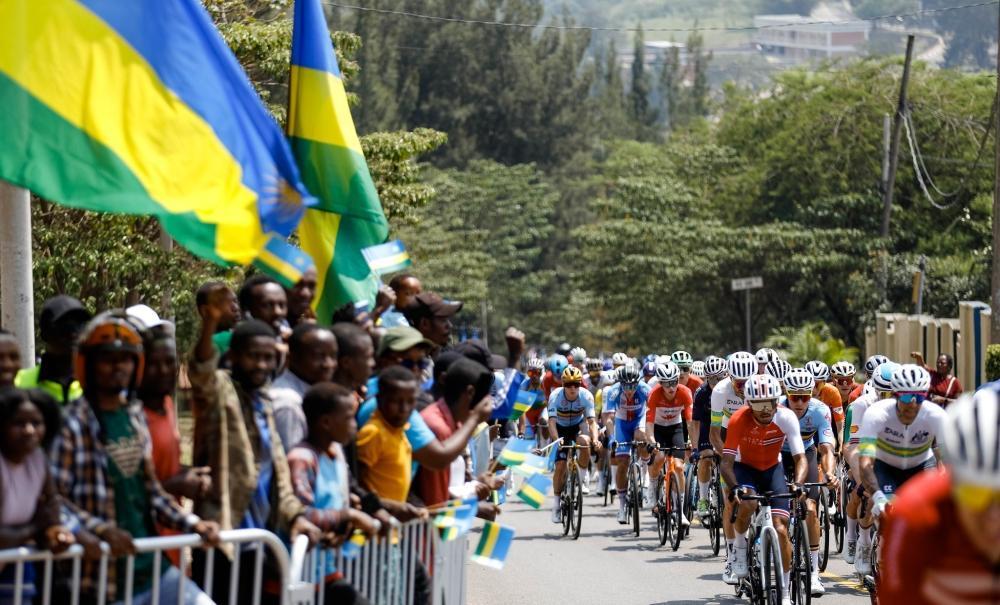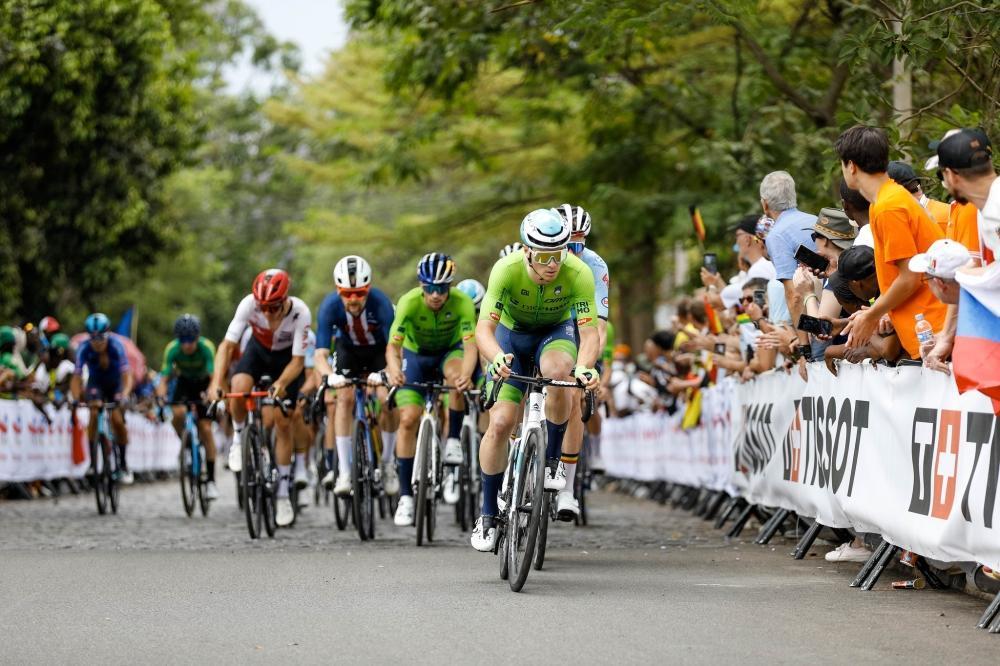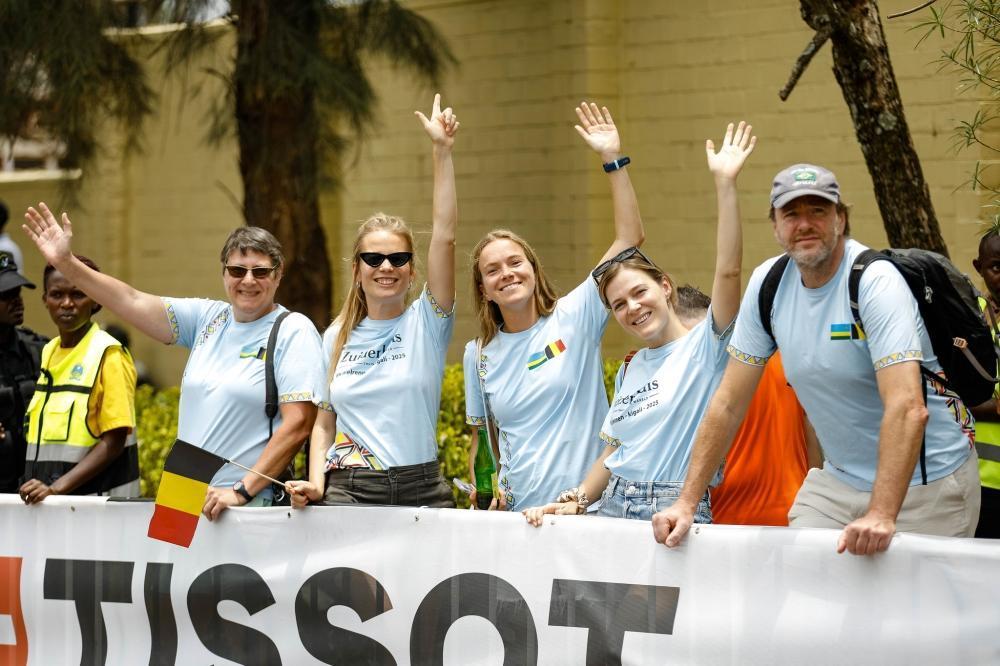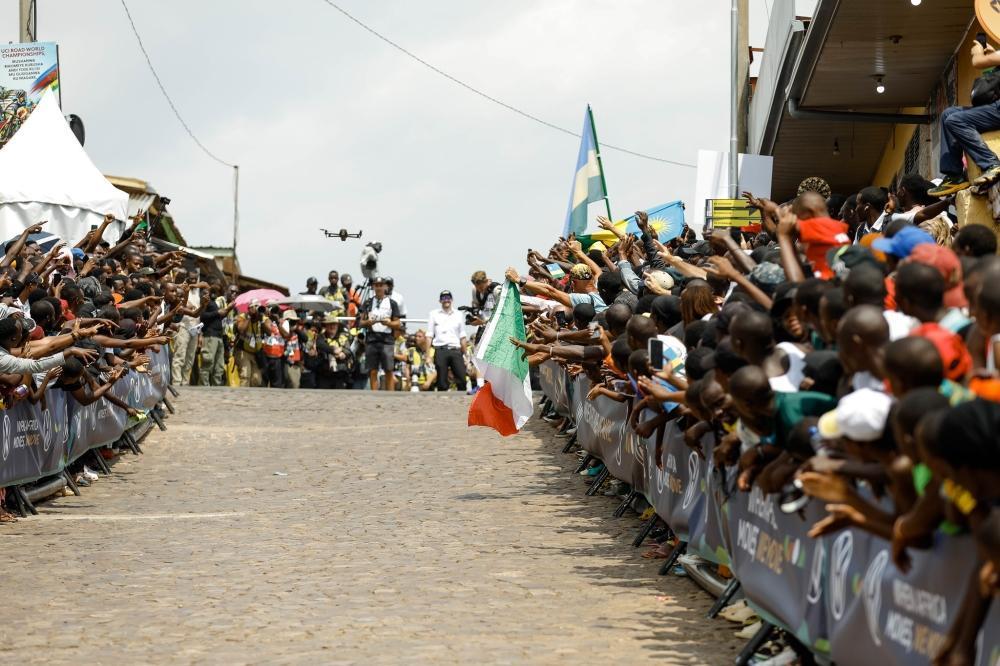Africa-Press – Rwanda. When the Union Cycliste Internationale (UCI) Road World Championships concluded in Kigali on Sunday, September 28, the city was not only hosting a global sporting event but also celebrating a historic milestone in Rwanda’s journey.
For eight days, Kigali transformed into a hub of colour, rhythm, and global unity.
Rwandans turned out in thousands, spilling into fan zones and lining the routes at Mur de Kigali, Nyabugogo, Mu Kabuga ka Nyarutarama, and other iconic spots. The atmosphere was electric, punctuated by drumming, cheers, and spontaneous dancing that continued well into the night.
Minister of Sports Nelly Mukazayire flaging off the race.
For many, it was a chance to live history. For others, it was proof that Rwanda could defy stereotypes and showcase itself to the world as vibrant, peaceful, and joy-filled.
A nation on its feet
From the start of the championships, the enthusiasm of ordinary Rwandans stood out. Crowds gathered at the fan zone around Kigali Heights and the Kigali Convention Centre (KCC), where the finish line stood and before that, in the BK Arena where the time trials started.
Screens broadcast the live races, DJs kept spirits high with a mix of Rwandan hits and global anthems, and food stalls filled the air with tempting aromas. Speakers lining the main roads ensured that the fans were regularly updated on the progress of the race.
“Every day felt like a festival,” said Serge Shema, a 30-year-old entrepreneur and cycling enthusiast. “For me it is an important milestone for the country. It might never happen again in our lifetime. So, I made sure, just as the riders get out every day to race, I also come out at least four hours a day to cheer them on, and to be part of this history our country is making.”
Along the roadside barricades, fans pounded on barriers in rhythm with the music, waving flags, and chanting names of their favourite cyclists. Foreigners and Rwandans mingled freely, breaking into dance circles on sidewalks. For the first time in living memory, Kigali’s streets became open-air dance floors, alive until late in the night.
Kigali redefines the “Rwandan Mood”
For years, skeptics and commentators outside the country described Rwandans as “reserved,” “unhappy,” or even “fearful.” The UCI Road World Championships decisively challenged that narrative. Every day of racing, crowds filled vantage points, their laughter and movement showing a different Rwanda; one of warmth, resilience, and unbridled celebration.
Rwandans turned out in thousands, spilling into fan zones and lining the routes at Mur de Kigali, Nyabugogo, Mu Kabuga ka Nyarutarama, and other iconic spots.
Kigali’s city planners and police played a crucial role. Road closures along the race routes were announced well in advance, running from about 9 a.m. to 5 p.m., with alternative routes clearly mapped out for daily commuters.
Public servants were encouraged to work remotely, schools in the city temporarily closed, and businesses adapted their hours. Local authorities used radio, TV, and social media to keep residents updated on closures and alternative routes. The result was striking: no stampedes, no accidents, no chaos. Only controlled, joyful crowds soaking in the spectacle.
The government even adjusted nightlife rules. For the duration of the championships, restaurants, bars, and entertainment venues were allowed to remain open until 4 a.m., creating an unprecedented wave of nocturnal celebration. Kigali became a city alive at night, with music and laughter echoing well past midnight.
Fan zones, DJs, and music as the glue
The fan zones at KCC and Kigali Heights became the beating heart of the event. Big screens displayed live races, DJs blended afrobeats with international hits, and emcees kept the audience engaged. From DJ Brian to DJ Ira, music was in full supply.
Floors and balconies of buildings with a strategic view filled up with enthusiastic fans. Families picnicked on lawns and stairs, students danced in groups, and tourists joined locals in impromptu parties.
“You could see tourists trying traditional Rwandan dance steps while Rwandans learned moves from Europe or America. It was a cultural exchange through music. We made good sales over the past eight days,” said Moise Munyaburanga, who was working on one of them at the KCC fan zone.
On Sunday, as riders approached the brutal climb of the Mur de Kigali, the noise became deafening. Fans lined both sides of the wall, banging on barriers, waving flags, and creating a tunnel of sound. It mirrored scenes from the Alps or Pyrenees during the Tour de France, but with a uniquely Rwandan flavour of drums and ululations.
Rwandans take pride
For many young people, the event was more than entertainment; it was a responsibility.
Diana Umurungi, 24, a university student, explained: “This was a historical moment for my country. I had to come here and enjoy it all. This is a proud moment for my country.”
Her words echoed across the fan zones. Rwandans wanted to show the world that they belonged on the global stage—not just as hosts, but as engaged participants.
Visitors redefine Rwanda in their eyes
The championships also gave foreign visitors a new lens on Rwanda.
Olivia Carlijn, a Belgian who travelled from South Africa to support her national team, said the Rwanda she experienced was not the one she had read about.
“You know a lot is written about Rwanda but when I came here, I realised the country is totally different from what we read. The people are happy, the country is peaceful, the roads are clean, the city is green. I will definitely be back to Rwanda soon.”
Thousands of fans at KCC at the conclusion of UCI Road World Championships on Sunday, September 28. Dan Gatsinzi
She was not alone. Many international fans told local media they were surprised by the country’s orderliness, hospitality, and safety. Kigali became a place where myths were dismantled and reputations rebuilt.
Organisation as a benchmark
Beyond the festivities, Rwanda’s organisation won plaudits. Volunteers were visible at every checkpoint, ready to guide visitors. Security officers maintained a discreet but firm presence. Medical teams stood on alert, though they were rarely needed.
Crowd control, often a concern at major events, was exemplary. By the end of the championships, there had been no major incidents. Many international commentators suggested Rwanda’s approach could become a model for how future road cycling events are managed.
Daily dedication
The championships demanded commitment not only from riders but also from the fans who turned up day after day. Some Rwandans even treated attending as a form of duty.
“Just as the cyclists give their best each day, we also felt we needed to show up consistently,” said Shema. “It was our way of telling the world: Rwanda is here, Rwanda is alive, Rwanda is part of this.”
Videos circulated widely on social media showing crowds dancing with tourists, young children waving flags, and groups of fans sprinting alongside riders at safe distances, echoing scenes from cycling’s biggest stages in Europe.
The global stage
On the competitive side, the championships delivered thrilling results.
Slovenian superstar Tadej Pogačar defended his world title with a commanding performance in the Men’s Elite Road Race, cementing his status as the face of modern cycling.
In other categories, Marlen Reusser of Switzerland won the Women’s Elite Time Trial, while Belgium’s Remco Evenepoel claimed the Men’s Elite Time Trial for the third year running. Canada’s Magdeleine Vallieres stunned the cycling world by winning the Women’s Elite Road Race, a breakthrough victory for her career.
Belgians cheer on Remco after winning ITT elite men category during the ongoing UCI Road World Championiships on Sunday, September 21. Photo by Dan Gatsinzi
The under-23 and junior categories also brought surprises, with Lorenzo Finn winning the U23 Men’s Road Race and Harry Hudson of Britain taking the Junior Men’s Road Race.
The crowning moment came on Sunday at the finish line, where President Paul Kagame, UCI President David Lappartient, and Prince Albert of Monaco awarded Pogačar his rainbow jersey amid thunderous cheers from fans who had witnessed history, as the Slovenian destroyed the race in real time.
More than a cycling event
For Rwanda, the UCI Road World Championships were more than sport. They were a chance to reshape perceptions, to unify people through music and movement, and to prove organizational capacity at a global level.
What unfolded on Kigali’s streets was not just a sporting competition but a cultural awakening. Rwandans danced openly, laughed freely, and mingled with visitors without hesitation. Rwanda’s reputation for order and discipline was complemented by a new narrative; of joy, rhythm, and community.
As the final ceremonies ended, Kigali exhaled in pride. The city had not just hosted a world championship. It had thrown open its heart to the world and, in return, been embraced as a place of possibility and spirit.
Legacy beyond the race
The championships may be over, but their legacy will linger. The smooth coordination of traffic, the extended nightlife, the communal joy—all of these set a new standard for how Rwanda organizes major events.
A view of the cobbled street of Kimihurura ‘Cote de Kimihurura’ that is ranked the most challenging route in UCI 2025 in Kigali. Dan Gatsinzi
For many Rwandans, the memory will live longer than the race. “This is history,” said Umurungi. “We will tell our children that once, in Kigali, the world came, and we danced together.”
And for visitors like Carlijn, Rwanda is now a destination she looks forward to revisiting. “I will definitely be back,” she said, smiling.
Beyond the daily races, the event brought out a strong sense of patriotism. Streets in Kigali and other towns were decorated with national flags, and young volunteers proudly donned uniforms that marked them as part of the UCI hosting team. For many, it was the first time they had engaged in an international event of this scale, and the pride was palpable in their faces as they welcomed visitors in multiple languages.
Hospitality was equally on display in neighbourhoods close to the routes. People opened their gates to strangers seeking shade, water, or directions while Inyange industries offered free water to the crowds.
Children offered high-fives to cyclists zooming past. It was a soft power moment for Rwanda. Ordinary gestures left visitors with lasting impressions of kindness and community, with many taking selfies and videos.
Professional cyclists shared their bikes with locals, many of who use a bicycle in their daily lives, some even having a test trial of the local bicycles. These were defining moments for a country.
In the end, the UCI World Championships were not just about crowning champions on bicycles. They were about crowning Rwanda as a country that could host, inspire, and surprise the world, on its own terms, and at the same time show other African countries that they can do it.
UCI President, Sports Minister Nelly Mukazayire at the opening of the global race.
For More News And Analysis About Rwanda Follow Africa-Press

